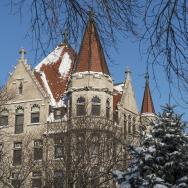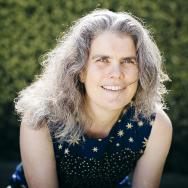Five University of Chicago researchers were named 2020 fellows of the American Association for the Advancement of Science on Nov. 24 for their distinguished contributions to the sciences.
Their work has shaped our understanding of the early universe; given scientists innovative tools to peer at the inner workings of cells; shaped the field of quantum chemistry; furthered breakthroughs in immunology and organ transplants; and helped fight the disease toxoplasmosis.
Profs. John E. Carlstrom, Anita S. Chong, Laura Gagliardi, Yamuna Krishnan and Rima McLeod were among 489 fellows elected as AAAS members for their scientifically or socially distinguished efforts to advance science and its applications.
John E. Carlstrom
John E. Carlstrom, the Subramanyan Chandrasekhar Distinguished Service Professor of Astronomy & Astrophysics, is a leading figure in the study of the cosmic microwave background—the light left over from the first few moments of the universe.
He has led two international experiments at the South Pole to map the cosmic microwave background; the Degree Angular Scale Interferometer from 1999-2003, and the South Pole Telescope, which is ongoing.
He was named for “distinguished contributions to studies of the Cosmic Microwave Background at millimeter/sub-millimeter wavelengths and for leadership in the associated technical development projects.”
Anita S. Chong
Anita S. Chong, Professor of Surgery, focuses her research on the immunology of how the body tolerates organ transplants, with a particular interest in understanding how inflammation, previous rejection or pregnancies affect tolerance.
She studies how the body tolerates transplanted organs, with and without medications, how new infections can lead to the rejection of previously-established transplants, and how immunological history prevents long-term graft acceptance, with the goal of identifying new strategies for inducing tolerance and preventing transplant rejection.She was named for “distinguished and pioneering contributions to the immunology related to organ transplantation, tolerance, and immuno-suppressive drug action.”
Laura Gagliardi
Laura Gagliardi, the Richard and Kathy Leventhal Professor of Chemistry and Molecular Engineering, is a renowned quantum chemist who heads the Chicago Center for Theoretical Chemistry and the Inorganometallic Catalyst Design Center.
Her research aims to develop novel quantum chemical methods and apply them to study phenomena related to sustainable energies, with special focus on chemical systems relevant to catalysis, spectroscopy, photochemistry, and gas separation.
She was named for her “outstanding accomplishments in developing and applying quantum mechanical electronic structure methods to multi-configurational problems in bonding, catalysis, and inorganometallic chemistry.”
Yamuna Krishnan
Yamuna Krishnan, Professor of Chemistry, is a groundbreaking chemist who crafts tiny “machines” out of DNA that can be used to monitor and explore how cells work at the microscopic level.
Such knowledge can help us better understand diseases and disorders, develop drug targets, and check whether a drug is reaching its intended target in a cell.
She was recognized for “the development of DNA-based fluorescent reporters and quantitative imaging of the ionic and chemical contents of sub-cellular organelles in live cells and animals.”
Rima McLeod
Rima McLeod, Professor of Ophthalmology and Visual Science and Pediatrics, is internationally recognized for her expertise and extensive research in toxoplasmosis—a disease caused by one of the world’s most common parasites.She specializes in the comprehensive care of congenital toxoplasmosis and other Toxoplasma gondii infections, and works to develop more effective screening, detection and treatment strategies for the disease.
She was recognized for “distinguished contributions to understanding the medical consequences of Toxoplasma gondii infection, the molecular mechanisms contributing to these consequences, and potential treatments.”
The American Association for the Advancement of Science (AAAS) is the world’s largest general scientific society and publisher of the journal Science. Founded in 1848, AAAS is open to all and fulfills its mission to “advance science and serve society” through initiatives in science policy, international programs, science education, public engagement, and more. For additional information about AAAS, see www.aaas.org.

